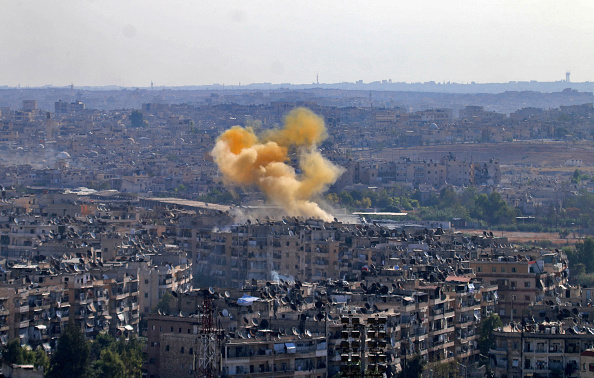Aleppo residents explain why they remain in the war-torn city


A free daily email with the biggest news stories of the day – and the best features from TheWeek.com
You are now subscribed
Your newsletter sign-up was successful
Anyone wanting to see the damage done in Syria since its civil war began five years ago need only look at photos of Aleppo.
The city was once the economic hub of the country, but after years of airstrikes and bombings, blocks of buildings have been destroyed, the streets covered in rubble. Aleppo covers an area almost twice the size of Paris, and control is split between the Bashar al-Assad regime, rebels, Kurds, and the Islamic State. It's believed that more than 1 million people still live in Aleppo, and in the rebel-held area, the Syrian American Medical Society says there is just one doctor for every 10,000 people, with food and medicine scarce. The U.N. Special Envoy for Syria, Staffan de Mistura, has a dire warning: "Between now and December, if we cannot find a solution, Aleppo will not be there anymore."
CNN recently spoke with residents who either refuse to flee the city or don't have the resources to do so. Mohammed, a 29-year-old father of a small child, said he spends his days looking for food, and when he does find it, the price is 50 times higher than it was six years ago. He lives in the rebel-held area, and says he wishes he had left before the government siege. "The regime has been bombarding the city over the last three years," he said. "It's very, very hard to live here. The new missiles are horrible. I can't stand living here anymore. It is a nightmare." He wants to leave, but doesn't have the $8,000 necessary to get to Turkey with his wife, son, and mother.
The Week
Escape your echo chamber. Get the facts behind the news, plus analysis from multiple perspectives.

Sign up for The Week's Free Newsletters
From our morning news briefing to a weekly Good News Newsletter, get the best of The Week delivered directly to your inbox.
From our morning news briefing to a weekly Good News Newsletter, get the best of The Week delivered directly to your inbox.
A woman named Salam who resides in the government-held area has a different story. She has a job teaching French at her son's school, and doesn't want to leave her home behind. She said she fears living in a refugee camp, and is just careful to duck under overhangs as she walks through the city streets. "It is not safe," she said. "We are being shelled regularly by the opposition with mortars." Read more of Mohammed and Salam's stories at CNN.
A free daily email with the biggest news stories of the day – and the best features from TheWeek.com
Catherine Garcia has worked as a senior writer at The Week since 2014. Her writing and reporting have appeared in Entertainment Weekly, The New York Times, Wirecutter, NBC News and "The Book of Jezebel," among others. She's a graduate of the University of Redlands and the Columbia University Graduate School of Journalism.
-
 How the FCC’s ‘equal time’ rule works
How the FCC’s ‘equal time’ rule worksIn the Spotlight The law is at the heart of the Colbert-CBS conflict
-
 What is the endgame in the DHS shutdown?
What is the endgame in the DHS shutdown?Today’s Big Question Democrats want to rein in ICE’s immigration crackdown
-
 ‘Poor time management isn’t just an inconvenience’
‘Poor time management isn’t just an inconvenience’Instant Opinion Opinion, comment and editorials of the day
-
 British warship repels 'largest Houthi attack to date' in the Red Sea
British warship repels 'largest Houthi attack to date' in the Red SeaSpeed read Western allies warn of military response to Iranian-backed Yemeni rebels if attacks on ships continue
-
 Houthi rebels claim Red Sea ship attacks
Houthi rebels claim Red Sea ship attacksspeed read Iran-backed Yemeni group vows to escalate aggression towards Israel-linked vessels in revenge for Gaza war
-
 Israel plans next phase of Gaza war as first hostages released
Israel plans next phase of Gaza war as first hostages releasedSpeed read After four-day ceasefire 'we will not stop' until destruction of Hamas, says Israel
-
 Mob storms Russian airport 'looking for Jews'
Mob storms Russian airport 'looking for Jews'Speed Read Plane from Israel surrounded by rioters chanting antisemitic slogans after landing in Russia's Dagestan region
-
 Tuberville's military promotions block is upending lives, combat readiness, 3 military branch chiefs say
Tuberville's military promotions block is upending lives, combat readiness, 3 military branch chiefs saySpeed Read
-
 Ukraine's counteroffensive is making incremental gains. Does it matter in the broader war?
Ukraine's counteroffensive is making incremental gains. Does it matter in the broader war?Speed Read
-
 US commissions first-ever Navy ship in a foreign port
US commissions first-ever Navy ship in a foreign portSpeed Read
-
 British spy chief, Wagner video suggest Prigozhin is alive and freely 'floating around'
British spy chief, Wagner video suggest Prigozhin is alive and freely 'floating around'Speed Read
